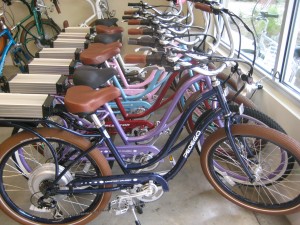Bike to the Future: Electric Bicycles Hit the Road in Austin
Austin has transformed into a major biking city in recent years. Rising gas prices, chronic city traffic, and limited parking are just some of the reasons why local residents have begun leaving their cars at home and getting on the seat. Having six-time Tour de France winner Lance Armstrong as a local celebrity helps, too.
Other factors, however, make the transition a bit more difficult. Record heat waves, limited bike lanes, and a hilly topography go a long way to deter Austinites from fully embracing cycloculture. Fitness and cost-saving factors are certainly persuasive, but are they really worth arriving to work drenched in sweat in the middle of July?
Rocket Electric, a new bike shop in East Austin, has a solution: electric bikes. The shop’s inventory consists entirely of battery-powered two-wheelers that come in a variety of models, ranging from $1,100 to $2,500 in price. They allow customers to conquer Austin’s hilly streets with just the flick of the “throttle” switch. A fully-charged electric bike can travel fifteen to twenty miles at a speed of about twenty miles per hour without a single bead of sweat.
But in Austin, some transportation interest group representatives have lent only tepid support for e-bikes. Dominic Chavez, the former treasurer for Sensible Transportation Solutions for Austin who’s currently running for a seat on Austin City Council, believes that more work should be done to improve biker safety, especially in neighborhoods with a high concentration of children riders, rather than diversify bicycle technology.
Many other cities – both inside and outside the United States – have already incorporated electric-powered bikes into their commuting infrastructure. For nearly a decade, San Francisco’s Noe Valley Cyclery has been helping San Francisco residents conquer the city’s notoriously steep hills with the help of its stock of electric-assisted bikes. Last May, England’s Peak District launched an electric bike rental system to attract visitors to the country’s northern region. And China, a country so fond of bikes that it’s earned the title “kingdom of the bicycle,” was home to around 100 million electric bikes as of 2010.
In fact, a visit to China was what inspired Nicole Zinn and John Dawson – the duo behind Rocket Electric – to invest in electric bikes. “We were looking at different things we could bring back to Austin,” Zinn remembers. She knew that Austin was a city in desperate need of two things: alternative energy technology and solutions to its worsening traffic problem. They briefly contemplated electric scooters but ruled them out on account of their hefty price tag.

Photo by Yana Skorobogatov for StateImpact Texas
A selection of Rocket Electric's battery-powered bikes
Electric bikes seemed like the next best thing. “I got on an electric bike and fell in love,” Zinn remembers. After learning that a single charge gave her enough power to travel twenty miles at twenty miles per hour – the maximum distance and speed most Austin commuters go when commuting to and from work – it seemed like a match made in heaven. And just because they’re electric bikes doesn’t mean that the fitness aspect is eliminated altogether. That’s because the bikes are hybrids: riders have the option of pedaling for exercise or sitting back and letting the bike’s lithium-ion battery do the work for them.
But not everyone shares Zinn’s enthusiasm. Cities in China’s prosperous Guangdong province, for example, have tried to ban e-bikes from their streets. Officials cited pollution caused by the improper disposal of the bike’s lead-acid battery, along with traffic law violations and accidents caused by e-bike riders, as reasons for the ban. Residents fought back by suing city governments for confiscating their bikes. They claimed that local bans on e-bikes are at odds with central government policy, including China’s recently revised energy saving law. They’ve also put forth the much more basic argument that the government simply doesn’t have the right to ban an entire class of vehicles from its streets.
So far, the City of Austin has abstained from taking an openly antagonist position on electric bikes. Pollution isn’t a major concern because most e-bikes sold the United States run on lithium ion batteries. If properly recycled, their carbon footprint is nearly invisible. Industry has been very receptive to the new technology. Austin Energy, for example, has pledged to give Rocket Electric customers a $100-150 rebate for buying one of their bikes, whether it be for commuting or recreational purposes. It’s all part of the Central Texas Clean Cities initiative, a program designed to cultivate partnerships with local businesses to promote alternative fuels and vehicles, fuel economy and hybrid vehicles.
Even the more established-bike shops in town that tend to cater to a more serious biking clientele have welcomed Rocket Electric to the Austin biking scene. “I think electric has a future here,” says Ted Arnold, General Manager of Austin’s Mellow Johnny’s, a bike shop owned by Lance Armstrong. “A certain segment of cyclists that might have a harder time [riding on conventional bikes] might be more willing to get on an electric bike.” In the end, all the bike enthuisasists agree that the priority is to find new and compelling ways to get people on the bike and leave their cars at home.

Photo courtesy of Yana Skorobogatov of StateImpact Texas
Electric bikes on display at Rocket Electric
Electric bike owners have proven to be more than willing to do so. Recent studies have shown that many of those who buy electric bikes for recreational reasons transition to using them for more practical purposes, like commuting and errand-running. A recent UC Davis study asked 27 electric bike owners to describe the evolution of their e-biking habits. Several respondents indicated that they had changed their usage from recreation – the reason they cited for purchasing the bike in the first place – to transportation, once they realized how convenient the bikes turned out to be.
Whether or not the trend electric bikes catch on in Austin remains unclear. But what we do know is that Austin residents could expect an El Nino summer, which means cooler days for locals to spend riding their bikes, electric or not. And that would be something everyone would be happy about.

